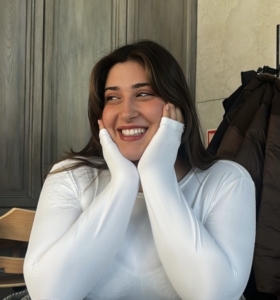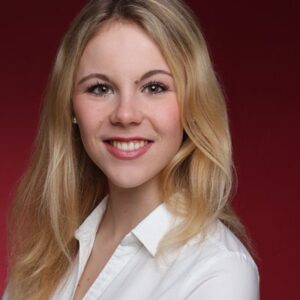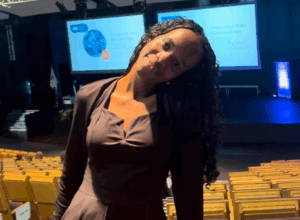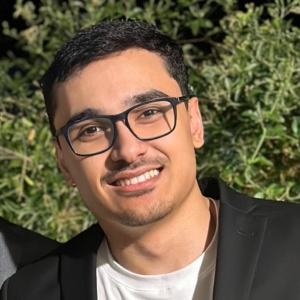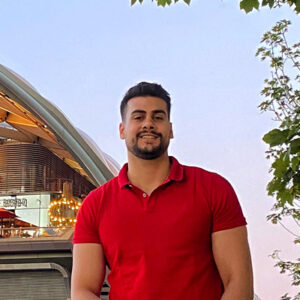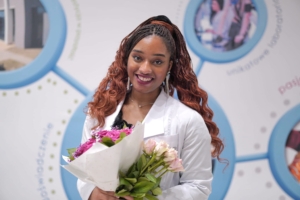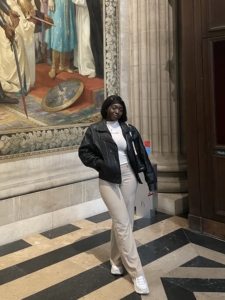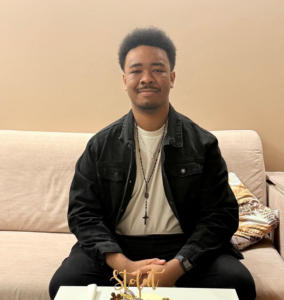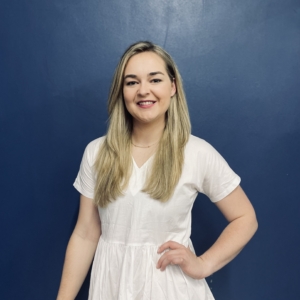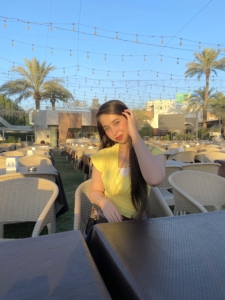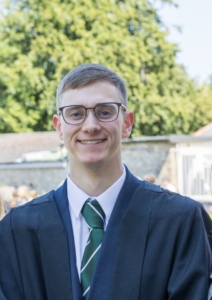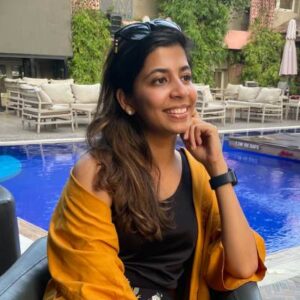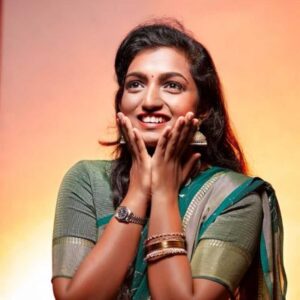
Azra Cetinkaya – 6MD
1. What is your name, where are you from?
My name is Azra Cetinkaya and I am from Turkiye.
2. Why did you decide to study abroad?
I saw how many opportunities would open up for me, not just during my studies but also after graduation. It felt like both a risk and an adventure — one worth taking for the future I’d been dreaming about since I was a kid. It was also chance to fulfill my dreams, how could I not take it!
3. Why did you decide to study medicine?
There are several reasons, but one stands out the most. When I was younger, I spent quite a bit of time in hospitals as a patient. Being in that environment, I saw firsthand how much of a difference doctors could make — especially when I was scared and they were there to comfort me. Growing up, I realized that I wanted to be able to offer that same comfort and care, to bring a sense of relief to people no matter their age, background, or illness. Even imagining myself in that role brings me so much joy.
4. What do you like about your studies?
I love that every single day brings something new to learn. My favorite part, though, is when I get to call my mom or dad and share what I’ve learned as a fun fact. They still get caught off-guard sometimes, which makes it even more fun 🙂
5. What was the strangest, funniest thing you have encountered during your stay here?
I’ll only say this; do not underestimate the Polish winter. The amount of times I’ve slipped and fell, got soaked in rain and went home or class freezing is infinite. I also remember during my first few months here, some people at the grocery store or the tram would think I was Polish and would just start speaking to me, and when I responded in English they just kept going! You never know what comes next and I kind of love that about here.
6. What is one part of your culture that you would like to share with Poles?
I think we share quite a few cultural similarities already, but one thing I’d love to highlight is our deep compassion for helping others. In Turkey, it’s very common for people to drop whatever they’re doing to help someone in need — no questions asked. And if that feels like too big a cultural trait to share, then I’d happily introduce everyone to Turkish breakfast culture instead. Trust me, it’s an experience worth having 🙂
Christina Kajca – Premed & 5DMD
1. What is your name, where are you from?
My name is Christina Kajca and I’m from Germany.
2. Why did you decide to study abroad?
I decided to study abroad because of the experience and because of the fact that I will study in English and will be able to practice in a lot of different countries other than Germany, after I graduate.
3. What did you like most about Premedical Course? What were the benefits of participating in it?
About the Premedical Course I liked that you slowly got introduced to the lifestyle and studying habits of a medical/dentistry student and that you learnt all the basic knowledge and language skills before you actually start your studies.
4. Why did you decide to study dentistry?
Since my mom is a Dentist and I spent a lot of time in her Dental Practice watching her working and got interested in dentistry pretty early already. My interest got bigger as I got older and finally after my High School graduation I decided to study dentistry at the MUL.
5. Why did you choose MUL?
I chose MUL because of its location in Lodz where part of my family lives and the Dentistry Department with modern Dental Units which enables students to learn their practical skills on a high quality level.
6. What do you like about your studies?
About dentistry I like the fact that you can improve the oral health of your patients and cure their diseases, as well as the interpersonal contact with patients and the room for career growth in this profession with so many various fields of specialization.
7. What was the strangest, funniest thing you have encountered during your stay here?
Lodz and its people are actually surprising me every day. From people casually carrying monkeys as a pet on their shoulder, others randomly dancing on the streets or participating in one of maaaany random parades you can see everything on a normal study day on the Piotrkowska street. Even if the weather here is as predictable as the drivers…not at all. One day you might take out your Flipflops because it suddenly got 30 degrees while during the next day you will need a paddle boat to get to Uni because cars are sinking on the streets due to all the rain.
8. What is one part of your culture that you would like to share with Poles?
Since Germany and Poland are neighbor countries there are actually a lot of similarities in their cultures. The only thing I could think of would be the hardworking, punctual and precise personality traits of a German I would show to a Polish person, since that’s what Germans are known for.
Diana Edward Kasmir – Premed & 6MD
1. What is your name, where are you from?
My name is Diana Edward Kasmir, and I am from Tanzania.
2. Why did you decide to study abroad?
I chose to study abroad because I wanted to find countries with better and more advanced educational systems that are more practical in comparison to Tanzania. I also wanted to explore beyond Africa and experience different cultures, as well as see how other people live and interact elsewhere.
3. What did you like most about Premedical Course? What were the benefits of participating in it?
I chose the Premed Course (PC) in Lodz, Poland, before starting my first-year course because I mainly wanted to learn the Polish language to make communication easier. This came with some unexpected subjects, like physics and chemistry, but I ended up enjoying Medical English (ME) and anatomy. ME taught me many medical terms and a lot about body systems, which made my first year smoother, especially in subjects like histology and medical biology that were taught in the first year. The extra knowledge I gained from PC helped a lot. I learned Polish through the Premed Course, which made my life easier, as I could use common phrases like “miłego dnia” to make people feel that their language was valued by a foreigner, and to better understand those who only speak Polish. I highly recommend the Premed Course because you will definitely see the benefits in the future.
4. Why did you decide to study medicine?
My biggest motivation to study medicine was my father, who had eye problems. I really wished I could help him when I was younger, but since I lacked medical knowledge, I couldn’t. Since then, I promised myself that I would study medicine to help him. Along the way, I developed a passion for the field and a desire to study medicine and return to my country to share that knowledge. I want to treat people who are suffering from diseases and lack access to doctors in my country, which often forces them to seek treatment abroad. I hope to contribute to improving the healthcare system and knowledge in Tanzania.
5. Why did you choose MUL?
MUL was recommended by my brother, who lives in Katowice. He first recommended it to my twin sisters. They both had a positive experience at the university, praising everything from the environment to the teaching methods hence convincing me to join here.
6. What do you like about your studies?
I really enjoy many aspects of my studies, but to put it simply, I love learning about the human body—from the molecular level to the organs and systems (biochemistry and histology). I’m fascinated by how and why things work the way they do, and what happens in different body parts. For instance, how mutation of a single chromosome in a fetus can affect the body. I also gained an appreciation for biostatistics, which is a great foundation for future research. It provided us with the research knowledge that every medical student needs, and it has been very helpful.
7. What was the strangest, funniest thing you have encountered during your stay here?
The strangest and funniest experience I had was related to buildings, buses, and trams. Polish buildings are very unique; they are mainly made of nice architecture and often feature beautiful carvings on the walls, making them stand out. The funny part happened when I was still new in Poland and I was waiting at a bus station. I stood on the opposite side of the road instead of the correct station because the stations were facing each other. Since I was new and didn’t read the station signs, I didn’t realize I was at the wrong one. I noticed that the time on my Google Maps kept increasing, and that’s when I realized I had taken the wrong bus. We had to get off, change buses, and continue our journey.
8. What is one part of your culture that you would like to share with Poles?
One part of Tanzanian culture that I would love to share with Poles is the spirit of “Ujamaa”. “Ujamaa” is a Swahili word that means “familyhood” or “togetherness.” It’s an important idea in Tanzania that emphasizes community, cooperation, and helping each other out, kind of like being one big family. In Tanzania, this spirit is often seen in how people work together, share resources, and support their neighbors. It creates a strong sense of belonging and looking out for one another. I think this idea of Ujamaa could be interesting for Poles because while Poland also has strong family and community ties, the emphasis on collective support and responsibility in Ujamaa is quite special. It’s about more than just being friendly; it’s about actively participating in each other’s well-being.
Maybe it could inspire even more ways for people in Poland to connect and support each other in their daily lives.
Rajab Mohammed Hassan – 5DMD
1. What is your name, where are you from?
My name is Mohammed and I’m from Ireland
2. Why did you decide to study abroad?
I chose to study abroad for the experience but mainly for the sense of independence. Being able to take care of myself, make my own choices, and build a future on my terms made studying abroad quite an easy decision.
3. Why did you decide to study dentistry?
My sister is a dentist, and I’ve spent quite a bit of time at her practice over the years. At first, I was just there helping out, but the more time I’ve spent there, the more interested I became until eventually I realized that I could see myself doing the same thing.
4. Why did you choose MUL?
MUL was recommended by my sister who studied here as well. She only ever had positive things to say about her experience here which made a big impression on me. I also had already visited Lodz a few times before applying and the environment just felt right for me. It was welcoming, comfortable, and somewhere I could see myself studying.
5. What do you like about your studies?
One thing I like about my studies, and I appreciate is that we work in smaller groups within the year group. It makes it easier to ask questions, get more support, and more importantly, feel more involved.
6. What was the strangest, funniest thing you have encountered during your stay here?
One of the funniest things I’ve encountered has definitely been the weather. One minute you’re out in a t-shirt enjoying the sun and the next minute a thunderstorm rolls in out of nowhere. I thought I was used to unpredictable weather coming from Ireland, but this place has taken it to a whole new level.
7. What is one part of your culture that you would like to share with Poles?
One part of Irish culture that I’d like to share is how much we value a good sense of humor and not taking life too seriously. There’s always time for a joke or a bit of friendly banter, it’s just how we communicate. I think it helps create a welcoming atmosphere and I’ve enjoyed sharing that with people here.
Marc Chalhoub – 5DMD
1. What is your name, where are you from?
My Name is Marc Chalhoub and I’m from Lebanon
2. Why did you decide to study abroad?
I always loved travelling and wanted to study abroad, it was definitely one the best decisions I have ever made. Studying abroad can be an incredibly rewarding experience that offers a wealth of benefits. It provides the opportunity to immerse yourself in a new culture, learn a new language, and broaden your horizons. You’ll have the chance to explore new places, make new friends, and gain a fresh perspective on the world. I believe that studying abroad is an excellent way to challenge yourself and step outside of your comfort zone. It can be a transformative experience that helps you to grow as a person and gain a deeper understanding of yourself and the world around you.
3. Why did you decide to study dentistry?
I am a very sociable person and I love communicating with people on daily basis especially in my job. Teeth are actually the first thing I look at when talking to people and that’s when I discovered that I’m really interested in helping people with their oral health and improve their quality of life. The oral cavity can reveal a lot about a person’s overall health, and many systemic diseases can manifest themselves in the mouth. . Nonetheless, I always loved the fact that dentists can work independently.
4. Why did you choose MUL?
The Medical University of Lodz is one of the top medical schools in Poland, offering a high-quality education to students from around the world and it was recommended to be by family friends and relatives.
5. What do you like about your studies?
Dental students have the unique opportunity to work with their hands and make a tangible difference in people’s lives. They get to develop practical skills that can help them restore patients’ oral health and function. This hands-on experience can be incredibly rewarding, allowing dental students to see the immediate impact of their work on patients. Additionally, dental students often form close-knit communities with their peers and faculty, sharing a passion for oral health and learning from one another. Overall, dental students have the opportunity to develop both practical skills and close relationships, making for a fulfilling and enjoyable educational experience.
6. What was the strangest, funniest thing you have encountered during your stay here?
First Monday after Easter, there is a polish tradition called Smingus Dyngus. Mainly it is throwing a bucket full of cold water on someone else. I never heard before about such a tradition. So basically, I got properly washed on my first Easter in Poland and ever since I became fully aware about this wet day.
7. What is one part of your culture that you would like to share with Poles?
Lebanon is a country of striking contrasts, where the old and new, east and west, and tradition and modernity converge. Nestled between the Mediterranean Sea and the rugged peaks of the Mount Lebanon range, this small country is blessed with natural beauty and a rich cultural heritage. It’s a land of ancient ruins, stunning architecture, mouth-watering cuisine, and warm hospitality. Despite its challenges, Lebanon remains a vibrant and resilient nation, known for its entrepreneurial spirit, creativity, and joie de vivre. Whether you’re exploring the bustling streets of Beirut, hiking through the scenic countryside, or lounging on a pristine beach, Lebanon never fails to captivate and inspire.
Melissa Akalonu – 6MD
1.What is your name, and where are you from?
My name is Melissa Akalonu, and I am from Nigeria and Ireland.
2. Why did you decide to study abroad?
I’ve always valued my independence, and my ability to adapt to different situations made studying abroad a really exciting choice for me! I get to travel, try different foods, experience new cultures and customs, speak new languages occasionally, and make diverse friends — all at once. It’s been such a fun and enriching adventure!
3. Why did you decide to study medicine?
For me, to be a doctor is to be an activist. The traumatic yet hopeful events of 2020 inspired me to pursue medicine as a way of standing for change. I believe diversity should be woven naturally into the fabric of every medical practice.
Though I dream of a world where patients receive excellent healthcare without fear of implicit bias, sexism, socio-economic barriers, or racial profiling, change only happens if people like me join the movement now.
Above all, I value compassion, because at the end of the day — we all bleed the same. In the future, I hope to specialize in Obstetrics and Gynecology (OBGYN), and later, become an IVF specialist.
4.Why did you choose MUL?
Honestly, it wasn’t a particularly exciting reason at first! My dad’s friend’s daughter had gotten admitted to MUL a few years before me, so it was really a case of word of mouth. But looking back now, it was one of the best decisions I ever made. I’ve found friends who have become like family — people I could never imagine my life without. I’m grateful the tides of life carried me to MUL’s shores.
5. What do you like about your studies?
I love knowing more than I already do. It’s a simple joy — but knowing that the knowledge I’m gaining today will allow me to be the best doctor I can be for my future patients truly makes me happy!
6. What was the strangest or funniest thing you encountered during your stay here?
Definitely the transport system! I absolutely love how fast and efficient Polish public transport is, especially compared to Ireland. But the first time I used the trams and buses in Poland, I thought they were free — because I saw people hopping on and off without paying! Later, I learned about the Migawka card, a prepaid transport card valid for three months. In Ireland, you usually pay the driver directly, but here it’s all self-service.
Long story short — after paying my first fine (oops!), I quickly learned to spot ticket inspectors. They’re very sneaky — they usually dress casually (black outfits are their go to) , so you have to be careful, especially of women in colorful clothes who look like regular passengers! Lesson learned: always validate your ticket. There’s actually a machine on the bus for that — I just didn’t know about it back then!
7. What is one part of your culture that you would like to share with Poles?
I would love people to know that Nigerians don’t speak “Nigerian” — because there’s no such language! Nigeria is incredibly diverse, with over 250 ethnic groups (tribes) and more than 500 languages, including English. We also have a fun, broken-down version of English called Pidgin English, which is widely spoken.
Nigeria’s diversity is one of its greatest strengths, and I’m always proud to share that with others!
Ikpe Emerald Obianuju – 6MD
1. What is your name, where are you from?
My name is Emerald Obianuju Ikpe. I am from Dublin, Ireland.
2. Why did you decide to study abroad?
My decision to study abroad was very sudden. I got an offer for Biomedical sciences instead of Medicine in my home country and decided to look at other options, as Medicine is the only course I connected with.
3. Why did you decide to study medicine?
I decided to study Medicine when I was 8 years old. It’s a bit cliche but I read a book called Gifted Hands written by Benjamin Carson, who performed the first successful surgery of conjoined twins and reading this really inspired me at such an early age to want to make a difference in people’s life and I developed a huge interest in Neurosurgery and Medicine. Now 13 years later here I am at MUL pursuing my dreams.
4. Why did you choose MUL?
I choose MUL based on recommendation. My very close friend was applying to MUL, and I had a family friend already in the MUL and so I heard a lot of positive reviews and felt at ease transitioning into new environment as I would have support.
5. What do you like about your studies?
I love that there is a lot of practical aspects involved in our studies. Even now in my pre-clinical years I have had a lot of experience with seeing different specialities and a lot of hands-on learning that many of my peers in other schools don’t get a chance to see till they reach the clinical years, so I am grateful for that experience. I also love the multicultural aspect of MUL I feel like I am a better and more well-rounded due to the exposure I have had to so many cultures, traditions, and beliefs I have been exposed too.
6. What was the strangest, funniest thing you have encountered during your stay here?
The funniest thing I have experienced here is definitely Fat Thursday. I had a huge shock going out randomly and seeing massive queues for donuts. It was something new and fun I learnt about Polish culture and now I will be prepared to stand in line next year lol.
7. What is one part of your culture that you would like to share with Poles?
When it comes to sharing culture I would reach for my Nigerian side, although I was born in Ireland, my family is Nigerian, and I lived in Lagos as a child. I would love to share Nigerian Cuisine. The Nigerian Cuisine is so full of many vibrant and spicy flavours that I think everyone should try at least once and it’s not just Jollof rice that we have lol, we have so many mouth-watering wonderful dishes.
John Ilobekemen – 6MD
1.What is your name, where are you from?
My name is John, and I’m from Malaysia.
2. Why did you decide to study abroad?
I’ve wanted to explore the very fact that there are always two sides of the same coin. In today’s world, that has always been driven and valued by interconnected perspectives and innovations, I personally think that such an experience of studying abroad could enrich not only my academic experience but also contribute to my personal growth by being able to navigate work environments and collaborating with people from diverse backgrounds. Many people, including me, perceive it as a challenging environment, but a motivating quote from a movie I watched has always been stuck to me: “If you can only do what you can do, you’ll never be better than what you are now.”
3. Why did you decide to study medicine?
It is the perfect profession for people who want to utilise their compassionate care for others to contribute to the greater good of society. My desire for medicine stems from a deep commitment to improving health for others, opening the door to a much better quality of life. I’ve witnessed the ability of doctors to provide hope, comfort, and reassurance during times of fear and uncertainty. Ultimately, I see medicine as a fantastic way to blend my intellectual curiosity, empathy and dedication to service, providing me with the opportunity to have a profound and lasting impact on the lives of others.
4. Why did you choose MUL?
It was well known by one of my relatives who also studied medicine in Poland, along with a couple of her friends. I’ve received nothing but compliments about Lodz and Poland as a whole, not only in the field of academics, but also in the quality of life as a student. The university has highlighted its culturally diverse student body, its internationally recognised medical diploma, opportunities to explore our own interests in the medical field, and an environment best suited for students. Its affordability to all of these feats is the perfect icing on the cake.
5. What do you like about your studies?
The university did not disappoint about its diverse student body, to which I find really exciting. Moreover, we have a lot of subjects that offer a mix of theoretical and practical classes, such as anatomy and histology, which benefits my learning experience to a tremendous extent, as I personally learn better from hands-on activities. Furthermore, after the academic year, we are assigned to do summer training, which gives us the opportunity to experience working in a clinical environment. As I believe that experience, other than knowledge, is a cornerstone to an amazing physician, such practical approaches will do wonders in our own personal quest to be the best doctor we can be.
6. What was the strangest, funniest thing you have encountered during your stay here?
On my first day of arriving in Poland, we went to a Lidl store to buy groceries. One of the things we bought was water in six 1.5L plastic bottles. Feeling thirsty, I took one of the bottles to drink, and it made a fizzy sound when I opened it. Drinking it made me realise that it was sparkling water, and it took me by surprise. I went back to the store, and I was perplexed to see that the bottle design and shape of sparkling and non-sparkling water is the exact same, unlike Malaysia and the other Asian countries I’ve been in, where there they have a distinct difference in shape and design. Fortunately, in Poland, the only thing that distinguishes the two are the words “Gazowana” and “Niegazowana”, with “Gazowana” meaning sparkling water.
7. What is one part of your culture that you would like to share with Poles?
The Durian fruit is Malaysia’s trademark fruit, famously known as the “King of Fruits”. It’s also known to be the smelliest fruit, bearing an odor that almost all of the people I know finds it absolutely revolting. We Malaysians ourselves have a love-hate relationship with the fruit. I only know a small amount of people who loves this fruit, particularly me and my mother. I’d really like to witness the Poles’ reaction to eating it, but bringing it would be a challenge since the smell of the fruit caused it to be banned by many airports.
Inge Konig – 6MD
1. What is your name, where are you from?
My name is Inge, and I am from South Africa.
2. Why did you decide to study abroad?
I started traveling abroad from quite a young age. My parents instilled in me a great love for it, and I loved experiencing all the different cultures, perspectives, and way of life in each country I visited. What better way to learn about the world, than experiencing it firsthand. With that in mind I decided to explore it even more during my studies. Being in Poland has offered me a chance to travel Europe, and not only learn about Polish culture, but also different cultures in Europe.
3. Why did you decide to study medicine?
I don’t really think I decided it, it’s just what I have always wanted to do since I can remember. I was the 1st grader that said she wanted to be a doctor when every other girl wanted to be a princess. The older I got, the more I resonated with the calling, and the rest is history.
4. Why did you choose MUL?
MUL is considered one of the best Medical Universities in Poland. It grants you amazing opportunities through the SKN’s (student clubs), EMSA and hosting conferences. You not only learn how to be a doctor, but you get the chance to network and build connections to other healthcare professionals.
5. What do you like about your studies?
What’s not to love? One thing that I really appreciate is that within the year group, we are divided into smaller groups ranging from 8-10 students. This grants you a more intimate study experience. No more big lecture halls filled with over 100 med students. You are not just a number at MUL, their goal is to really help you and make you the best doctor you can be.
6. What was the strangest, funniest thing you have encountered during your stay here?
No massive funny moment, but one thing I will say is that some of our lecturers have been an absolute blast, they really try to make the classes memorable, fun and sometimes funny. We have had some great laughs in class.
7. What is one part of your culture that you would like to share with Poles?
One thing I truly miss about being here is South Africa’s sporting culture. I miss being able to watch Rugby and Cricket (both massive sports in South Africa). If I can teach the Poles anything it would be loving Rugby like they love Football.
Dimah Al-Azzawi – 6MD
1. What is your name, where are you from?
My name is Dimah Al-Azzawi, and I’m from Iraq.
2. Why did you decide to study abroad?
I’ve always had a strong desire to explore the world beyond my home country. Having lived in the same place my whole life, I felt it was important to step outside my comfort zone and experience something new—not just for personal growth but also for academic and professional development. Studying abroad, especially in the field of medicine, opens up so many more opportunities than I would have access to back home. It’s not just about the degree—it’s about learning new languages, interacting with people from diverse cultures, and gaining a more global perspective.
3. Why did you decide to study medicine?
I’ve always been surrounded by family members working in healthcare, and from a young age, I looked up to them with admiration. Their dedication truly inspired me. I’ve always seen medicine as an incredibly honorable and meaningful profession—being able to make a difference in someone’s life, even in the smallest way, is a privilege I deeply value. This path is also a tribute to my family, especially my grandmother, whose biggest dream was to see me become a doctor. Of course, medicine is known for being challenging and competitive—but that’s exactly what excites me. It requires resilience, patience, and true passion—qualities I believe I possess.
4. Why did you choose MUL?
I chose the Medical University of Łódź because it came highly recommended by people I trust—my cousins and relatives who studied here and spoke very positively about their experience. Their success and the strong academic foundation they received at MUL really influenced my decision from the very beginning. Even before applying, I had my mind set on this university. The city itself is incredibly student-friendly—calm, affordable, and perfect for focused learning. You can truly feel it’s a city built around student life, which makes it easier to adapt and thrive.
5. What do you like about your studies?
What I like most about my studies is how deeply they connect theory with real-life purpose. Studying medicine isn’t just about memorizing facts—it’s about understanding how the human body works, how diseases develop, and, more importantly, how we can help people heal and live better lives. Subjects like anatomy and pathology really fascinate me because they help me visualize and understand the human body in a detailed, practical way.
6. What was the strangest, funniest thing you have encountered during your stay here?
One of the funniest things that happened to me in Poland was during my first weeks here when I went grocery shopping and accidentally bought kefir, thinking it was regular milk. I had no idea what kefir was at the time, so I poured it into my cereal the next morning, and let’s just say I was very confused by the taste and texture. I thought the milk had gone bad! Later, I asked one of my Polish classmates, and they explained what it was. Now, I actually like it—but back then, I had no clue.
7. What is one part of your culture that you would like to share with Poles?
Food is a big part of my culture, and I would love to share our traditional dishes like dolma, biryani, or kubba. Cooking and eating together is something that brings families and communities closer in Iraqi culture, and I think Polish people would really enjoy the flavors and the stories behind each dish.
Marco Trolese – 6MD
1.What is your name, where are you from?
My name is Marco and I’m from Ireland.
2. Why did you decide to study abroad?
I decided to study aboard as I wanted to experience a new culture, gain a broader perspective and challenge myself by stepping outside my comfort zone. Moving to a different country for my studies has given me the opportunity to develop independence, adaptability, and a deeper appreciation for diversity. It is an experience that goes beyond academics.
3. Why did you decide to study medicine?
I have always had a interest in the human body and science, but my passion for medicine sparked when I broke my arm as a child. Seeing firsthand how doctors can directly improve a person’s health and well-being, made me realise that I wanted to pursue a career where I could make a difference in a person’s life.
4. Why did you choose MUL?
I chose MUL because of its strong academic reputation and internationally recognized medical program. The diverse student body and the opportunity for clinical exposure early in the program made it an ideal choice for me. Additionally, its location provides great accessibility for travel in Europe. Studying at MUL gives me access to numerous career opportunities after graduation.
5. What do you like about your studies?
One thing I really enjoy about MUL is the early clinical exposure. From first year, we have compulsory summer training where we gain hands-on experience in a clinical setting. This practical approach allows us to apply what we’ve learnt in the classroom to real-life scenarios, making the learning process more engaging and meaningful.
6. What was the strangest, funniest thing you have encountered during your stay here?
One cultural tradition I’ve encountered in Poland is Tłusty Czwartek (Fat Thursday). It marks the beginning of the last week before Lent, in which you enjoy as many doughnuts (paczki) as possible. This is similar to Shrove Tuesday (Pancake Tuesday) in Ireland, where we enjoy pancakes before the start of Lent.
7. What is one part of your culture that you would like to share with Poles?
One aspect of an Irish culture that I would share with my Polish friends, would be Irish music and dance. Traditional Irish music is lively and full of history, and Irish dancing is a fun and energetic way to express our culture.
Misty Rohatgi – 6MD
1. What is your name, where are you from?
My name is Misty Rohatgi and I’m from India.
2. Why did you decide to study abroad?
As my parents live in Nigeria, I was intrigued to learn about varied culture and languages in other parts of the world.
3. Why did you decide to study medicine?
Well when I was a child I loved playing with doctor sets. My uncles who are pharmacists got many sample tablets at home, which I used to play and prescribe them. Looking at my nature of helping others and the will to give back to humankind, the childhood game became a reality.
4. Why did you choose MUL?
Living all my life in the hustle bustle of bigger cities, I wanted to experience living in a student city. Lodz happened to be one of them and is also close to Warsaw, in case I need to travel anywhere. Lodz is in the middle of Poland which makes it easier to explore Poland.
5. What do you like about your studies?
The fact that we not only gain the book knowledge, but also that the Dr’s teach us through their own clinical experiences. They not only help us with our subjects but also guide us for our future career choices.
6. What was the strangest, funniest thing you have encountered during your stay here?
The weather in Lodz is so unpredictable. I would walk outside wearing summer clothes and then get soaked in rain.
7. What is one part of your culture that you would like to share with Poles?
There are so many to be shared, however I reckon Holi, a festival of colors is what I would like to present. The purpose of the celebration is to welcome the spring. Colors bring happiness, brightness, joy to our lives.
Thesrika Sukumar – 6MD
1.What is your name, where are you from?
I am Thesrika Sukumar and I am from Malaysia
2.Why did you decide to study abroad?
Well I actually wanted to experience studying in a different environment meaning with people of different nationalities, cultures and tradition. This is an opportunity for me to witness a completely new way of life. I consider studying abroad also as a chance to experience different styles of education. On top of this, I will return with a new perspective on culture, language skills, a great education, and a willingness to learn. Needless to say, all of these are very attractive to future employers.
3. Why did you decide to study medicine/dentistry?
I have always been amazed by how complex the human body is and how the different systems in the body coordinate so well to have it work efficiently. So, I wanted to learn more in detail about it. As a student and later in my career I’ll be having a direct impact on people’s lives that will certainly satisfy my sense of duty of giving back to the society as well.
4.Why did you choose MUL?
I have been to Lodz earlier and quite like the place. When I visited the University earlier, I liked the approach of the administrative officers. It gave me a good impression on this university. In addition to that, I had friends here who recommended this university.
5.What do you like about your studies?
I like the fact that we don’t only learn courses that we are supposed to have knowledge on but also some other subjects that are interesting and related to the field of medicine.
6.What is one part of your culture that you would like to share with Poles?
I am a traditional Indian dancer. So, I think I would like others to see the unique form of performing arts in my culture as I believe it explains more about my culture and tradition that what words can describe.
